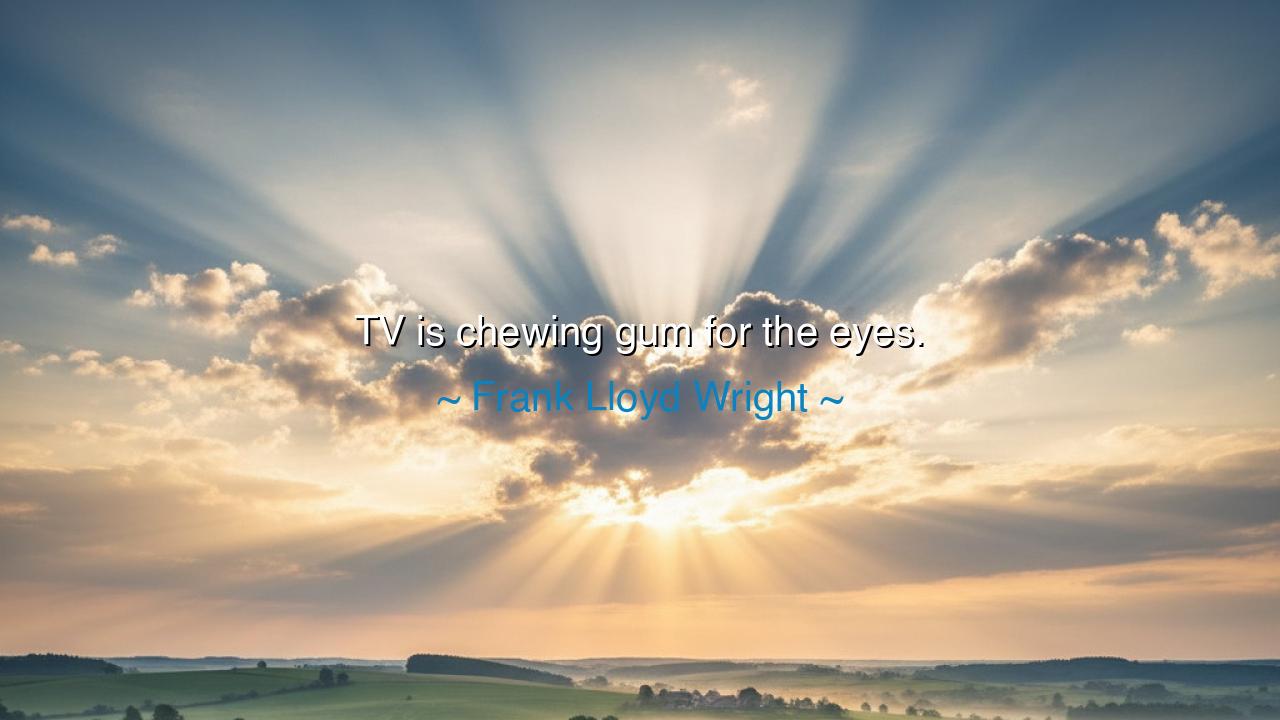
TV is chewing gum for the eyes.






Listen, O Seekers of Truth, for the words of the great architect Frank Lloyd Wright, when he uttered that “TV is chewing gum for the eyes,” he spoke with the fire of one who had seen the soul of humanity distracted by empty, fleeting indulgences. His words are an invocation to awaken, to cast aside the false comforts of the mindless and to seek deeper nourishment for the spirit. This metaphor, though simple in its form, carries a profound weight, one that reverberates through time like the wind across the desert.
In the ancient days, the wise men and women warned of the dangers of indulgence, of seeking comfort without substance. The Greeks, in their great wisdom, cautioned against the pursuit of pleasure alone, for they knew that true fulfillment came not from the shallow consumption of fleeting pleasures, but from the pursuit of knowledge, virtue, and the connection between mind, body, and soul. Wright’s words echo these ancient teachings, drawing a sharp line between that which fills us temporarily and that which enlightens and nurtures us for eternity. The act of watching television, much like chewing gum, provides momentary satisfaction but leaves one empty, craving more of the same, never nourished, never truly fulfilled.
Think of the ancient philosophers who would gather in the Agora, debating the deepest truths of existence, seeking understanding in the midst of the bustling world. Their minds were like gardens, tended carefully with the knowledge that fed them, and they were ever mindful of the kind of sustenance they allowed to enter. They would never choose the empty calories of mindless entertainment, for they knew that the soul requires more than distraction to grow. And so, Wright’s comparison of television to chewing gum for the eyes calls forth this ancient wisdom: that our minds, like gardens, should not be given to mere superficial indulgence but should be nourished with that which promotes growth, insight, and depth.
In the course of history, many have felt the pull of easy distractions. Consider the emperor Nero, who, in his indulgence, would gather his people in the Coliseum, watching gladiators fight for sport, and he himself would entertain his court with lavish spectacles. What did these games provide? Only the fleeting excitement of bloodshed and spectacle, much like the modern television, which offers the illusion of connection through stories, but in truth, often leaves the soul hollow. Nero’s distraction was a symptom of his time, as is television to ours. Both take away our capacity for deep reflection, for true connection with others and ourselves.
Wright’s words serve as a reminder: that while the chewing of gum might provide momentary satisfaction, it cannot nourish the body, and the mindless consumption of television cannot feed the spirit. There is a greater truth to be found in seeking out the depths of the human experience rather than skimming across the surface. Whether it is through the reading of profound literature, the contemplation of art, or the engagement in deep conversation, these pursuits require effort and attention, yet they reward us with nourishment that lasts far longer than the transient pleasure of a flickering screen.
Consider the wise kings of old, who sought counsel with sages, who spent long nights reflecting on the mysteries of life, who knew that true power came not from the distractions of the world, but from the clarity of vision and purpose. Their minds were not clouded by empty diversions, but were sharpened by the pursuit of wisdom. In the same vein, Wright’s words urge us to question how we spend our time and energy. Are we indulging in quick fixes of satisfaction that leave us craving more, or are we seeking the things that truly sustain our minds and hearts?
And so, O Seekers, heed the call to awaken from the slumber of convenience. Look beyond the screen that flickers before your eyes and see the world around you. Let your mind feast upon the great works of art, literature, and philosophy, and allow the soul to drink from the well of true knowledge. The path is not easy, for it requires effort and discipline, but it is the path of the greatest fulfillment.
Let the TV be but a passing moment, an occasional indulgence, if you must, but do not allow it to dominate your life. Seek instead the enduring nourishment of the mind, heart, and soul. Like the great philosophers of old, choose the lasting wisdom of thoughtful reflection, of true learning, of real engagement with the world around you. Let your eyes see not the fleeting images of a screen, but the world of beauty, truth, and wisdom that lies just beyond it.






AAdministratorAdministrator
Welcome, honored guests. Please leave a comment, we will respond soon